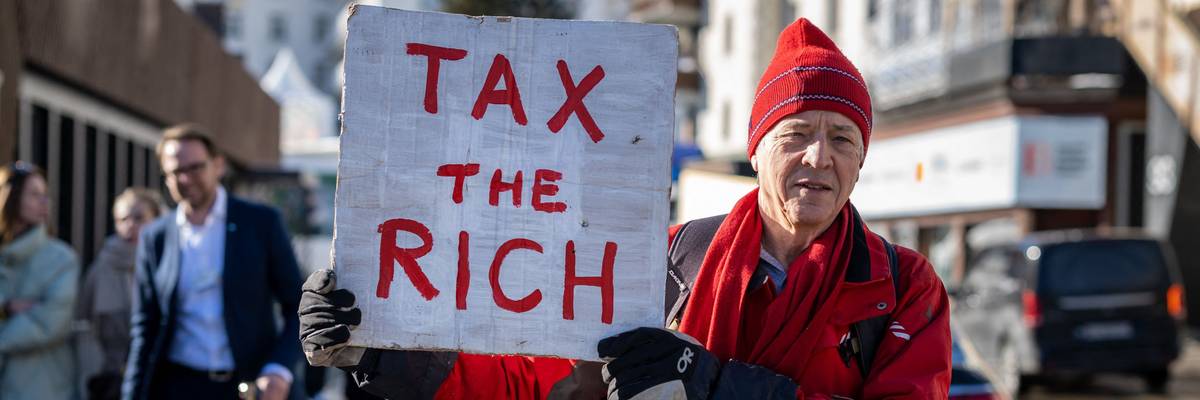This year’s G20 Leaders Summit is taking place in Johannesburg, a short distance from Constitution Hill, a former prison complex that once held Nelson Mandela and other South African democracy fighters. As the world’s most powerful leaders meet behind closed doors, this former apartheid prison turned museum will publicly write another page in the history of global economic emancipation.
Movements, workers, activists, thinkers, creatives, artists, and communities from across South Africa, Africa, Asia, and Latin America are gathering for a three-day People’s Summit for Economic Justice — a counter to the G20 — to build the power of the 99 percent. The Constitution Hill’s Old Fort, Women’s Jail, and former men’s prison cells are hosting radical conversations, art, music, and action for the Global Majority to tell their own story, share struggles and solutions, and show that another world isn’t just possible — it’s already being built by communities writing their own future.
The G20 member countries account for over 85 percent of the global GDP. Over this forum’s two and half decades of existence, the G20 has failed to use its combined economic weight to steer global financial, trade, development, and fiscal policies to address global economic and environmental challenges. Instead, it has served the interest of the 1 percent: elites, corporations, and billionaires.
As a result, a handful of billionaires and super rich people globally have amassed far more wealth than they need, abusing the power they possess. They are wrecking democracies across the world as they make rules in their favor at the expense of the 99 percent and the planet.
South African President Cyril Ramaphosa appointed an “Extraordinary Committee” of independent experts that published the first-ever G20 global inequality report earlier this month. The report shows that the richest 1 percent has captured 41 percent of all new wealth since 2000, while the bottom half of humanity received just 1 percent. The report notes that one in four people globally now face food insecurity even as the wealth of billionaires reaches levels equivalent to up to 16 percent of global GDP. Those words will not mean much to those on the frontlines of inequality without action, without redistribution.
The International Monetary Fund, the World Bank, and other bodies have also acknowledged that extreme inequalities are thwarting the pace and sustainability of economic growth, eroding social cohesion and trust, and undermining democratic institutions and political stability that is fueling conflict and social unrest. However, they are still part of the problem, not the solution.
Enraged young people from Morocco to Madagascar, Kathmandu to Lima continue to lead street protests worldwide demanding accountability and challenging economic systems because they are not working for them. They are frustrated by poor service delivery, abuse of power concentrated in the hands of a few, unfulfilled promises, economic systems that continue to squeeze the little they earn, unemployment, unjust debt and climate breakdown.
They are drawing a red line against the failed systems and saying loud and clear, “Enough is enough.”
This is a time bomb and a bigger explosion threatens the planet and everyone on it, regardless how fat their bank account is. But we have solutions. This is not rocket science and the global majority, the 99%, have the answers and are already putting them into practice.
Wealth taxes are a progressive solution to address extreme inequalities — far better than the consumption taxes that many governments in the Global South are imposing on their people to service unjust debt and compensate for unpaid taxes by the super-rich. Taxing the super-rich can generate significant recurring revenue and restore public trust. Tax revenues from the super-rich are enough to fund essential services, such as education, healthcare, and social safety nets, which are key drivers of long-term inequality reduction.
Participants in the People’s Summit are also demanding that rich polluters pay for just transitions to clean energy. They are calling for redistributing health care to guarantee reproductive justice and bodily autonomy. And they are demanding protection of civic space and cultural rights by defending the freedom to speak, organize, and create.
The 2025 G20 Leaders Summit taking place not far from the We the 99 Peoples Summit has an opportunity to right the wrongs of the past by listening to the global majority that are gathered at Constitution Hill. Global leaders, including the G20, must stop turning for solutions to the same elites who created and continue to fuel the inequality crisis. Instead, they need to listen to the voices of the 99% – the people who have endured inequality and survived against all odds.
The 99% hold the answers. And the answer is clear: replace the system built by the 1% with a system designed for and by the 99%.




